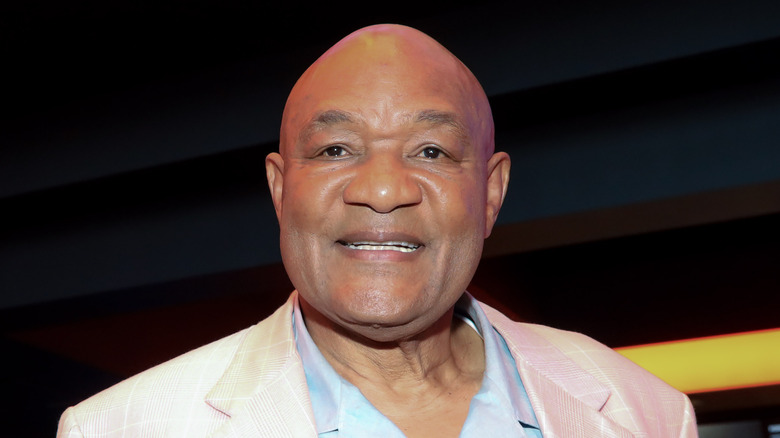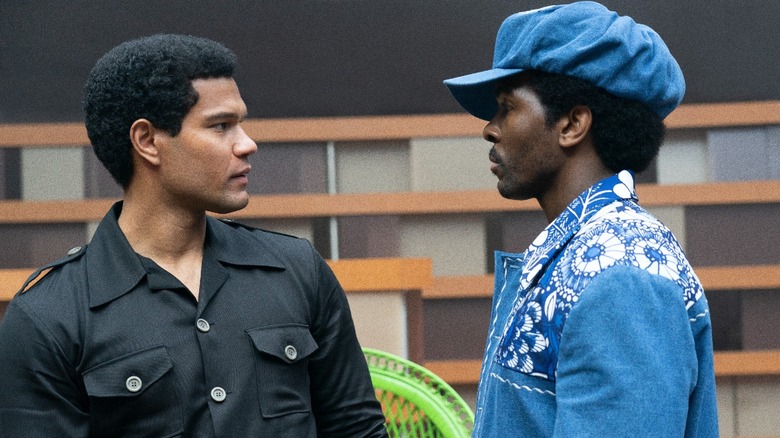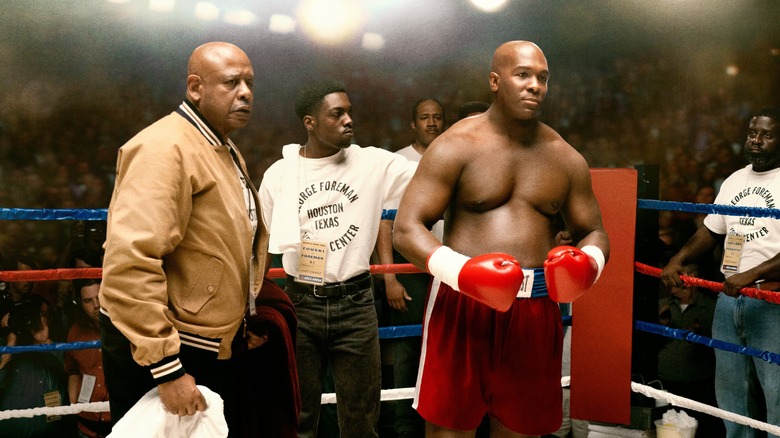Boxing Legend George Foreman On How He Felt Seeing His Life On-Screen - Exclusive Interview
If you're as famous as George Foreman, two-time world heavyweight champion of boxing, it's almost a guarantee that someone will make a movie about your life. But even for a guy as tough in the ring as Foreman, watching your past unfold on the screen can be unsettling. "I was frightened at first, but then I learned to embrace it," says the boxing legend about the new movie "Big George Foreman: The Miraculous Story of the Once and Future Heavyweight Champion of the World."
"Big George Foreman" begins with a young boy born into extreme poverty in Marshall, Texas, who's saved from a life of crime by a government program called the Job Corps and a man there named Doc Broadus. That man sees something in the menacing Foreman and begins training him as a boxer. Less than a decade later, in 1973, Foreman defeats Joe Frazier and is crowned the world heavyweight champion — a title he reclaims 21 years later at the age of 45, becoming the oldest boxer to ever win it.
Along the way, Foreman amasses and loses a fortune, has a near-death experience that leads him to embrace Christianity, becomes minister of a Houston church, opens a youth center bearing his name, and makes a second fortune marketing a little cooking item called the George Foreman Grill — while transforming from an angry, brooding teen into a warm, friendly cultural icon.
All that is brought to the screen in "Big George Foreman" by director George Tillman Jr. and star Khris Davis, perhaps best known from the show "Atlanta," who portrays several astonishing transformations across three decades of Foreman's life. "People ask me, 'Who is George Foreman?'" the real Foreman tells Looper. "I tell them, 'Khris Davis.' He brought this character to life."
Watching your life story play out in a movie theater
How does it feel to see your life play out on the screen in front of you while you're still living it?
It's not easy, because I spent a lifetime trying to hide my life. There you are — you got a big fence around your home so nobody could come in, tinted windows in your cars, dark glasses. You hide your life. Now, all of a sudden I had to reveal it and then have it revealed in a movie theater. That wasn't easy, and I was frightened at first, but then I learned to embrace it. The art of movie [story]telling is really wonderful.
Was there anything that was off limits to [director] George Tillman Jr. and the writers, or did you want them to be honest, flaws and all?
I didn't want them to tell everything about my life, but there I [was] in a position [where] George Tillman and those guys wanted to direct a true story. They put into art what I couldn't even put in[to] words. [I saw] those early moments of my childhood and how deprived I had been, but then in the end, [it made] me proud of everything that had happened to my life. They put in[to a] script and in[to] art what I couldn't say, and I loved the movie.
What are your thoughts on Khris Davis' performance? What did you see watching him, and did you and he talk about it before or after?
The couple of meetings I had with Khris Davis where I looked him in the eye, he tried to look away. I said, "No, look me in the eye." He looked me in the eye, and evidently, he saw himself, and from that point on, he made the George Foreman story come alive. People ask me, "Who is George Foreman?" I tell them, "Khris Davis." He brought this character to life.
The legacy of George Foreman
What would you like people to take away from watching your story — both people who may be spiritual or religious and people who may not be?
The movie was great [at showing what it's like] to start with no hope. A lot of us out there don't have hope, but we can find hope, and that's what the movie tells us. [It's] about starting off with nothing, not even hope itself, but yet if you stick with it and find people who believe in you as Doc Broadus did — Forest Whitaker plays that part — never giving up on you, there's nothing that you can't achieve. Believing in yourself a little bit will not hurt, either.
What do you see as your greatest legacy?
What I'm most happy about is to be alive. I was given a second chance to live, and there were a lot of people who pulled me out of the ditch and the slop, and they never even told me about religion at all. They just loved me, and I'm happy about that. [This] movie tells the story of a lot of people. It wasn't a religious journey. [It] was a journey of pulling up their fellow man in me. They helped me.
This interview has been edited for clarity.
"Big George Foreman: The Miraculous Story of the Once and Future Heavyweight Champion of the World" hits theaters on April 28.


